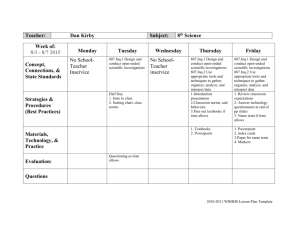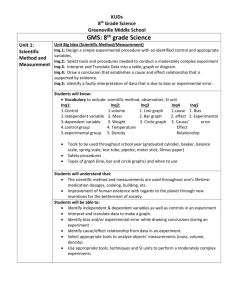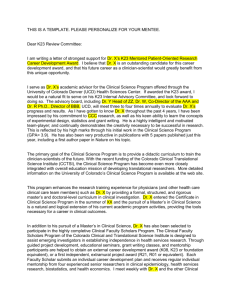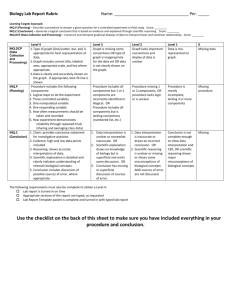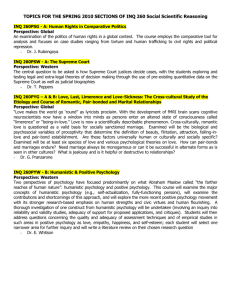IP3 Network Data Policy
advertisement
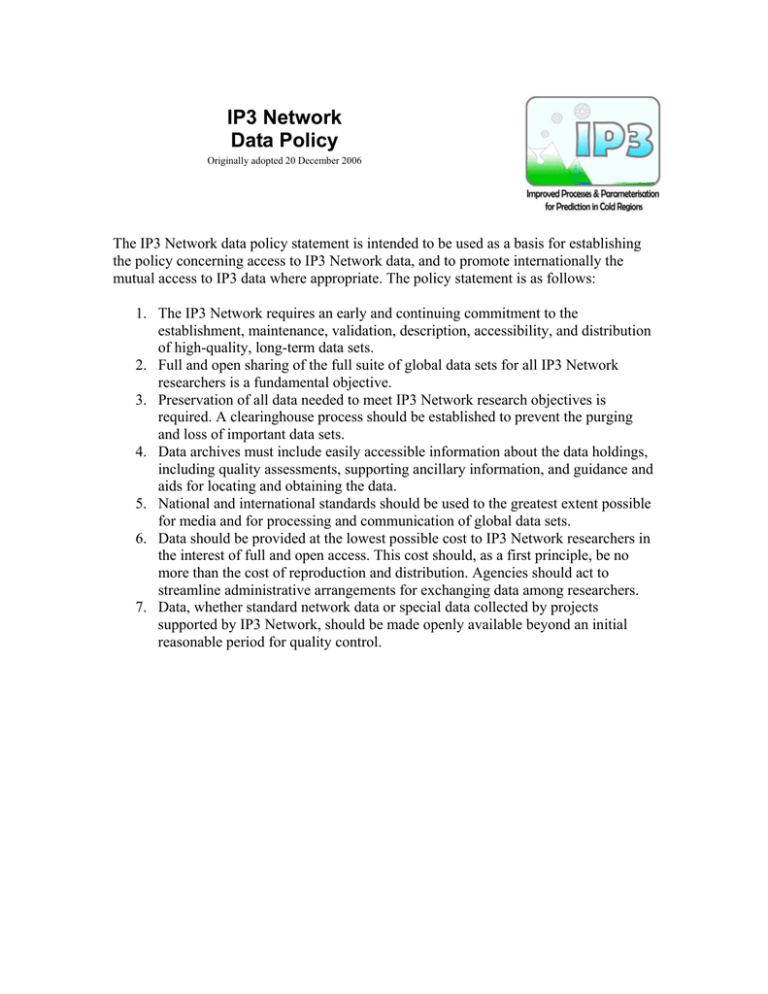
IP3 Network Data Policy Originally adopted 20 December 2006 The IP3 Network data policy statement is intended to be used as a basis for establishing the policy concerning access to IP3 Network data, and to promote internationally the mutual access to IP3 data where appropriate. The policy statement is as follows: 1. The IP3 Network requires an early and continuing commitment to the establishment, maintenance, validation, description, accessibility, and distribution of high-quality, long-term data sets. 2. Full and open sharing of the full suite of global data sets for all IP3 Network researchers is a fundamental objective. 3. Preservation of all data needed to meet IP3 Network research objectives is required. A clearinghouse process should be established to prevent the purging and loss of important data sets. 4. Data archives must include easily accessible information about the data holdings, including quality assessments, supporting ancillary information, and guidance and aids for locating and obtaining the data. 5. National and international standards should be used to the greatest extent possible for media and for processing and communication of global data sets. 6. Data should be provided at the lowest possible cost to IP3 Network researchers in the interest of full and open access. This cost should, as a first principle, be no more than the cost of reproduction and distribution. Agencies should act to streamline administrative arrangements for exchanging data among researchers. 7. Data, whether standard network data or special data collected by projects supported by IP3 Network, should be made openly available beyond an initial reasonable period for quality control. IP3 Network Data Access Policy Originally adopted 20 December 2006 1 INTRODUCTION The IP3 Network Data Access Policy has been established to promote and govern the access of data collected within the IP3 research area by IP3 Network Investigators (NIs), IP3 Collaborators (COs), and IP3 Partners (PAs). IP3 embraces as open an approach as possible to the exchange and access to data for scientific and non-commercial/ non-profit uses. This approach must respect the rights of the data originators who have invested considerable effort in obtaining and/or generating data. For this reason, policies for those participating in IP3 are different from those not participating or contributing to the project. These policies are described in the following sections. All relevant terms are defined in Section 7. This data access policy must be reviewed on an annual basis. At that time, the policy may be modified to improve its usefulness. 2 REQUESTS FROM IP3 INVESTIGATORS Requests from IP3 NIs, COs, and PAs will be given priority over non-participants in the project. Access to datasets for IP3 research will be unrestricted to IP3 NIs and COs after the data have been quality-controlled and documented by the originating IP3 NI. IP3 COs will direct their data requests through their associated IP3 NI. 2.1 Special IP3 Datasets Special IP3-funded datasets (observations and model results) can be obtained by IP3 NIs through the IP3 web site. To ensure that only IP3 NIs and COs have access, this portion of the IP3 web site will be password protected. Passwords will be supplied by the IP3 Network and Information Manager (NIM). IP3 datasets can also be obtained directly from the originating IP3 NI. In accordance with the IP3 Network Data Policy, IP3 NIs have a responsibility to make their IP3-funded datasets openly available to other IP3 NIs and COs after an initial reasonable period for quality control and documentation (following the IP3 Data Documentation Guidelines). This period will nominally be no longer than one year unless there are special circumstances (for example, if early release of data would jeopardize a graduate thesis) and an extension is granted by the Scientific Committee. After this quality control period, use of the data will be restricted to other IP3 NIs and COs for a period of one year, after which the data must be made publicly available. 2.2 Operational Datasets [MSC Climate Datasets] Operational datasets from the Meteorological Service of Canada (MSC) climate archive will be made freely available to IP3 NIs, COs, and PAs, only for use in their IP3 research. 1 of 3 IP3 Network – Data Access Policy Use of data obtained from the climate archive is governed by the MSC Data Product License Agreement. IP3 NIs and COs are urged to read this agreement carefully. Access to the data will be available from the password protected portion of the IP3 web site. This will ensure that only IP3 NIs and COs have free access to the operational datasets. Passwords will be assigned by the IP3 NIM. 3 REQUESTS FROM NON-PARTICIPANTS Requests for data from the research community at large are invited, but requests by nonparticipants need to be approved on a case-by-case basis. Non-participants may become IP3 COs by teaming with an IP3 NI, who will subsequently apply to the IP3 Scientific Committee for permission to allow the new IP3 CO. Alternatively, non-participants may apply to the IP3 Scientific Committee to become an IP3 PA (following the IP3 Partnership Policy – see guidelines for becoming an IP3 Partner on the IP3 website). 3.1 Special IP3 Datasets Special IP3 datasets (Observational and Modeling results) will only be made available to non-participants after a one year period in which IP3 NIs and COs have exclusive access. This period will begin after the IP3 dataset has been quality controlled by the originator. 3.2 Operational Datasets [EC/MSC Climate Datasets] Operational datasets from the Environment Canada MSC climate archive will not be supplied to non-participants by IP3. These datasets can be obtained from the Climate Information Branch of Environment Canada. Similarly, archived model output data may be obtained from the Canadian Meteorological Centre. Charges for the data and additional data use restrictions may apply. 4 REQUESTS FROM COMMERCIAL ENTITIES Permission for anyone (IP3 participants (NIs, COs, or PAs) or non-participants) to use IP3 datasets for commercial/profitable purposes must be given by the IP3 Scientific Committee. 5 REQUESTS FROM OTHER NATIONAL AND INTERNATIONAL GROUPS National and international commitments for sharing of IP3 datasets before the data becomes public will be considered on a case-by-case basis by the IP3 Scientific Committee. 6 ACKNOWLEDGMENT Any use of special IP3 datasets resulting in publications requires, in the event of major data usage, discussion of and agreement on appropriate co-authorship with the originating 2 of 3 IP3 Network – Data Access Policy IP3 NI and, in the event of minor data usage, acknowledgement of the originating IP3 NI. For clarification on issues pertaining to publication of special IP3 datasets, contact the IP3 Scientific Committee. Any use of IP3 datasets requires at a minimum, acknowledgement and citation in any resulting publications of the IP3 dataset and, when applicable, citation of earlier studies by the IP3 NI responsible for the data. Appropriate citations are included with many of the IP3 datasets. If you would like to cite data for which a citation is not provided, please contact the IP3 NIM for help in citing the data. Acknowledgement of the use of IP3 data should also be made using a statement with the following format: “The [***] data in this paper was provided by the Improved Processes and Parameterisation for Prediction in Cold Regions Network (IP3).” where [***] refers to the actual IP3 data used. 7 DEFINITIONS 7.1 IP3 Dataset An IP3 dataset can be: • observational, either station data or gridded data, resulting from IP3-funded work, or • model derived output, either utilizing IP3 special observations or resulting from IP3-funded work 7.2 IP3 Network Investigator (NI) An IP3 NI is defined as one who: • contributes scientifically to IP3, and • has been recognized as such by the IP3 Scientific Committee. 7.3 IP3 Collaborator (CO) An IP3 CO is defined as one who: • is working with a IP3 NI, and • has been recognized as such by the IP3 Scientific Committee. 7.4 IP3 Partner (PA) An IP3 PA is defined as one who: • contributes scientifically to IP3, but is not a IP3 NI nor a CO, and • has been recognized as such by the IP3 Scientific Committee. 7.5 IP3 Network and Information Manager (NIM) The IP3 NIM is the person who manages the IP3 Secretariat, including ensuring a ready flow of information within IP3 and maintenance of the IP3 website and data archive. 7.6 Non-Participant Non-participating researchers include any researchers who are not IP3 NIs, IP3 COs, or IP3 PAs. Non-Participants include the general public. 3 of 3 IP3 Network Data Documentation Guidelines Originally adopted 20 December 2006 To assist in meeting the objectives of IP3, and to provide a useful and lasting legacy for further research, it is necessary that all data collected for IP3, both observational and significant model results, be properly documented. It is the responsibility of the originating IP3 Network Investigator (NI) to ensure that the data collected is properly documented. The IP3 Data Access Policy provides for a time period after data collection for the IP3 NI to quality-control and to document his/her data. With respect to model output, the end of a data collection period is defined as the model run after a significant model revision (e.g. change of physics; improved routing; coupling). Data documentation should be complete enough to allow unfamiliar researchers to replicate and use the data in the future. IP3 Observational Data Documentation Guidelines The observational data documentation should contain the following headings: 0. Title 1. Abstract - Name the dataset and describe why the measurement was undertaken and how it relates to IP3. 2. Contact Information - Give sufficient detail (name, affiliation, full address, telephone and fax numbers, e-mail, etc.) to contact those most knowledgeable about the dataset. 3. Site Description - including the following: - Data Period(s) and Location(s) - Equipment used -including manufacturer and model numbers. - Methods/Software used - in acquiring the data. - Data Format - including examples. 4. Data Processing/Quality Control - including the following: - Methods/Software used - in acquiring and processing the data - Post-Collection Data Processing -description of any processing done on the data. - Quality Control Methods - give an indication as to the degree of quality control. - Datasets Archived -original “raw” data should be one of the archived datasets in addition to any processed or QC’ed data. 5. References 1 of 2 IP3 Network – Data Documentation Guidelines IP3 Model Data Documentation Guidelines The model data documentation should contain the following headings: 0. Title - Model name, version number. 1. Abstract - briefly describe the model and its properties and describe why the model run was undertaken and how it relates to IP3. 2. Contact Information - Give sufficient detail (name, affiliation, full address, telephone and fax numbers, e-mail, etc.) to contact those most knowledgeable about the model run. 3. Run Description - including the following (valid web links acceptable): - Period(s) and Location(s)/Resolution/Map Projection - Initialization and Boundary Data used - Model used - complete description of the model, physics package, any coupling state, etc. - Data Format - including examples. - Archive Location/Media - online link or offline contact person. 4. References 2 of 2
